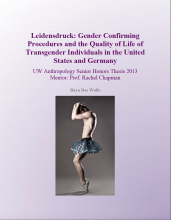Abstract
President Obama’s recent inaugural speech [Referring to his second term beginning January 2013] included the call for equal rights for members of the GLBT community. Among the issues especially transgender people face are access restrictions to transition related health care. This project examined the implications for transgendered people in terms of access to gender-confirming surgical procedures and how this affects their quality of life. The sites of this study were the United States and Germany, two countries using the same parameters to determine if a person suffers from Gender Identity Dysphoria, the clinical diagnosis required to undergo gender-confirming procedures. In the US these procedures are widely not covered because they are labeled elective or cosmetic. German law on the other hand mandates full health insurance coverage as surgery is considered a necessary and effective treatment of a clinically established condition.
This project used quantitative data collected with questionnaires and qualitative data in the form of life history interviews. It compared the results of the National Transgender Discrimination Study with responses to a selection of the same questions by transgender Germans. Findings indicate that access to transition related care via health insurance improves the mental and physical wellbeing of individuals whereas access limited due to lack of coverage can be detrimental. Life histories were evaluated according to the Grounded Theory approach to identify common themes throughout the narratives. The participants reported lower rates of depression and drug use after gender-confirming procedures and a generally higher quality of life. Yet due to the small size of the German sample these findings are not representative. Furthermore, even though gender-confirming procedures are effective, they should not be understood as mandatory for trans or gender-nonconforming people.
